Highlights from the 2024 EU Arctic Forum
The Interreg NPA participated in the EU Arctic Forum and Indigenous Peoples’ Dialogue and EU-Arctic Youth Dialogues, jointly organized by the European Commission and the European External Action Service, on 14-15 May in Brussels.
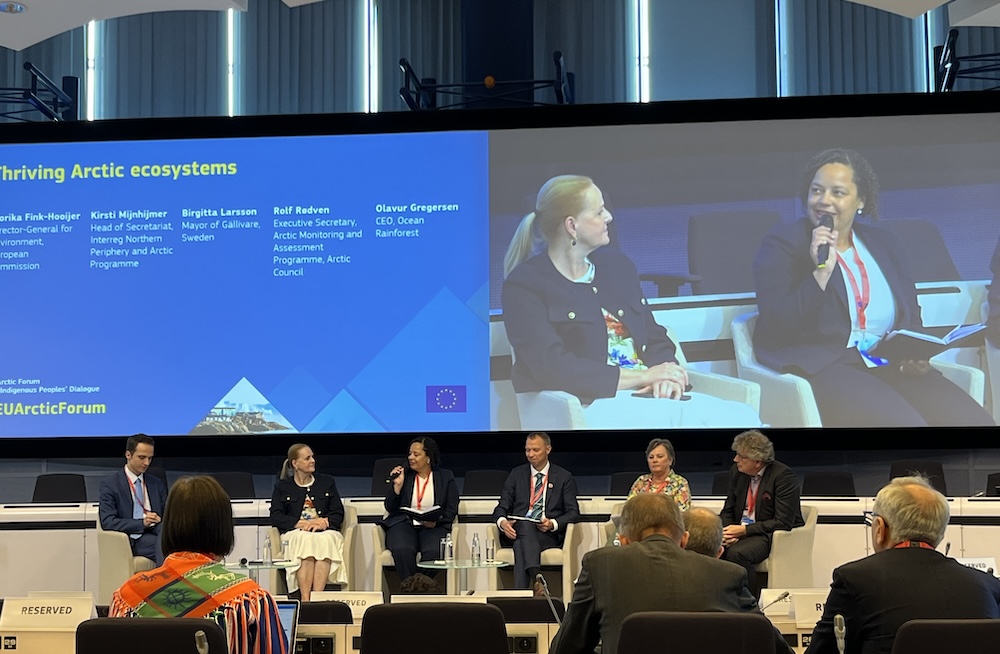
This conference brought together political leaders, civil society, industry representatives, researchers, indigenous peoples, and youth from across the Arctic to discuss developments and challenges in the region. The focus was on inclusive and sustainable development through climate change adaptation and mitigation, sustainable entrepreneurship, emergency management, and research.
The EU’s current and potential contributions to these Arctic regions were highlighted, including the role of Interreg programmes.
Interreg Arctic Programmes for Thriving Ecosystems
The conference showcased how projects funded by Interreg NPA and Interreg Aurora help to protect Arctic ecosystems, and address climate change impacts and adaptation, integrating local and indigenous knowledge into key decisions such as land-use planning.
Interreg cooperation allows Arctic communities from Finland to Greenland to work together and learn from each other’s best practices, thereby increasing their capacity for environmental protection and climate adaptation.
Kirsti Mijnhjimer, Interreg NPA Head of Secretariat.
Kirsti presented concrete examples of projects funded by Interreg NPA and Interreg Aurora, highlighting collaborative efforts to tackle Arctic-specific challenges such as oil spills and plastic pollution in the sea (Circnets), and promoting regenerative nature tourism to ensure a positive impact on Arctic ecosystems (REGGAE). The contribution of Ar2Cord and NoBiCC preparing buildings in the Arctic for the influence of a changing climate was also mentioned, in addition to projects focused on environmental protections, such as Felles Fjellrev, protecting the Arctic fox, and Our Precious Transboundary Waters, focused on joint water management in the Pasvik river catchment on the Finnish-Norwegian border.
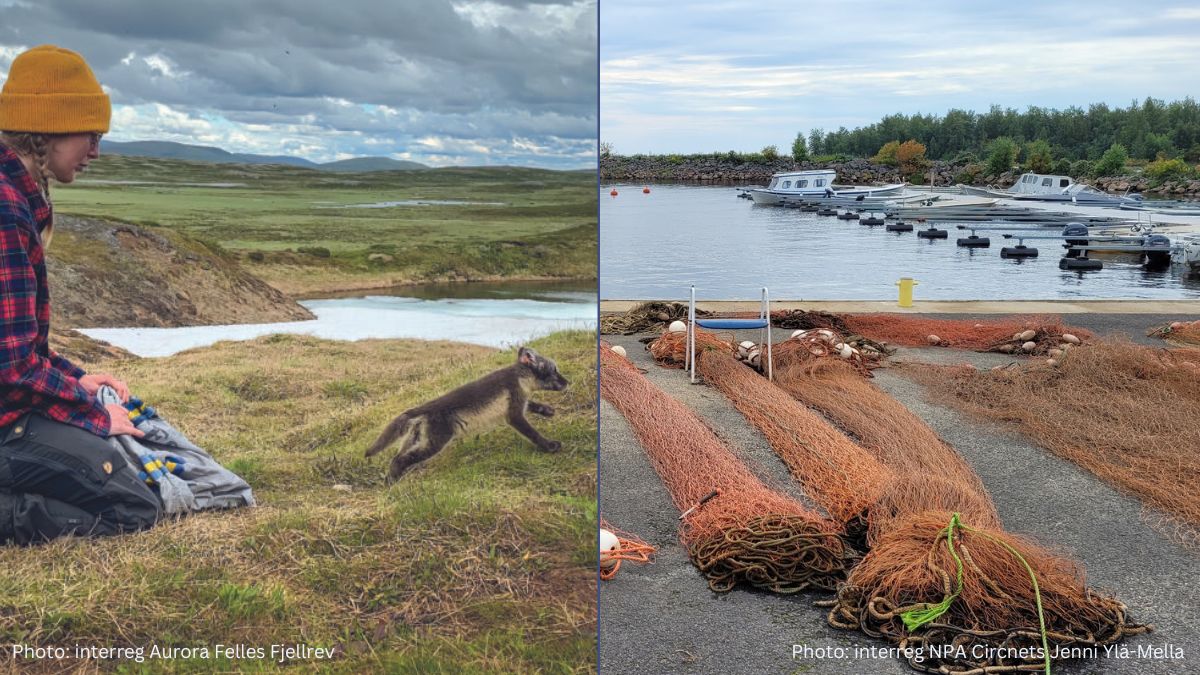
Interreg programme are tools for long-term objectives
Moray Gilland from the EU Commission DG Regional Policy described Interreg programmes as “a main tool for working together on joint long-term objectives.” According to Mr Gilland, these programmes enable communities to “look jointly at what needs to be done together, jointly determine priorities and create a common purpose.”
Interreg projects like RYE Connect, which empowers young people to start local businesses, and NEW NORTH, which addresses security of supply, create connections that are essential for achieving sustainable goals in the Arctic
Valuing local and indigenous knowledge for sustainable development
Opportunities for including local and indigenous knowledge in transnational and cross-border cooperation are important explains Kirsti, "Especially when it comes to climate change and disaster risk prevention in Arctic communities, local and indigenous knowledge is crucial".
One example is the BusK project, which developed a participatory GIS system collaboratively with reindeer herders, to gather local input in migratory routes for spatial planning. Through the project, a railroad in Northern Sweden now has ecoducts (overpasses) for reindeer. The Adapt Northern Heritage project made a climate risk plan for the preservation of a Sámi cultural site called Bartjan in Northern Sweden, which suffers from invasive species. Integrating local traditional knowledge in the scientific tourism brand, the SCITOUR project worked in Eastern Greenland to develop a tourism and educational experiences around narwhales, now that whale hunting is limited to quotas.
The cross-border programme Interreg Aurora has a sub area dedicated to Sápmi, the homeland of the Sámi across Norway, Sweden, and Finland. They fund projects that take into account Sámi traditional knowledge árbediehtu, which includes values, practices, and a holistic understanding of the interlinkages between people and nature/ the environment. For example, the project MÁHTUT supports, promotes and preserves traditional Sámi subsistence skills in the era of green transition, such as Sámi ideas of circularity and food sovereignty. It also addresses indigenous rights, and other legal aspects. Another example is AirHerd, using drones in reindeer herding, based on the traditional Sámi experience-based knowledge.
Indigenous Peoples’ Dialogue
The forum continued with the Indigenous Peoples’ Dialogue, emphasising the importance of giving indigenous communities a voice and a decision-making role in Arctic matters. It was highlighted how local indigenous knowledge is crucial in building resilient societies.
Jutta Urpilainen, EU Commissioner for International Partnerships, emphasised the need for inclusivity, resources, and knowledge to support indigenous communities. Clara Ganslandt, EU Special Envoy for Arctic Matters, highlighted EU actions for inclusion and diversity. Following this, Lasse Valkeapää from the Saami Council discussed the challenges and opportunities for indigenous participation in EU systems, and the efforts of the Recap Asap Interreg Aurora project to overcome these challenges.
Speakers highlighted the importance of integrating traditional knowledge into sustainable development policies, emphasising the need for proper consultations and informed consent for decisions impacting indigenous lands and resources.
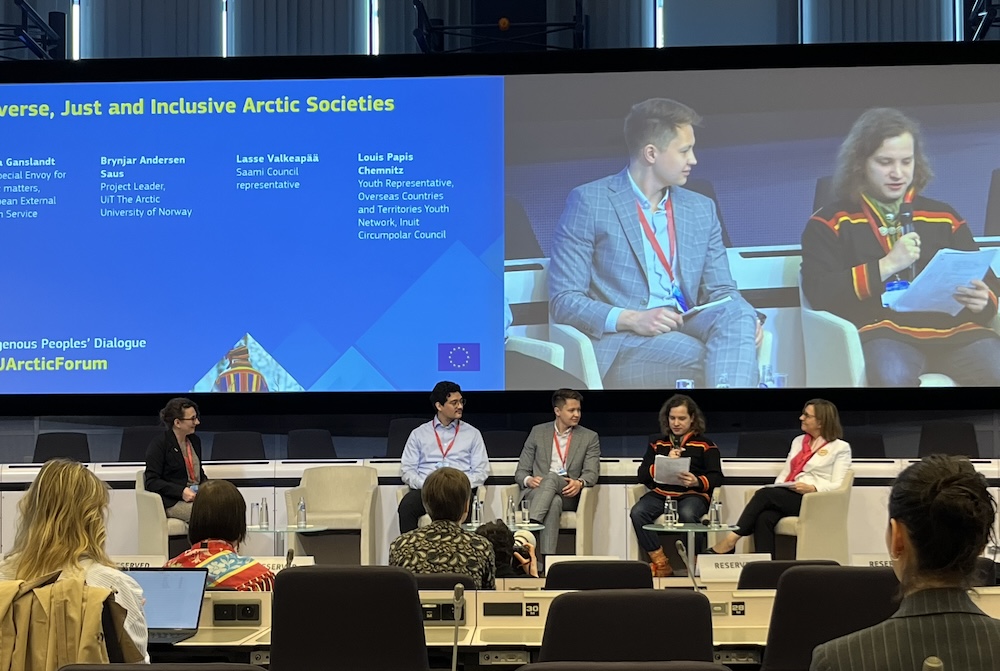
From left: Corine Wood-Donnelly, Associate Professor of International Relations & the High North, Nord University; Louis Papis Chemnitz, Youth Representative, OCT Youth Network, Inuit Circumpolar Council; Brynjar Andersen Saus, Project Leader, UiT; Lásse Valkeapää, Saami Council; Clara Ganslandt, EU Special Envoy for Arctic matters, EU EEAS.
EU-Arctic Youth Dialogue
The EU-Arctic Youth Dialogue was launched at the event, with opening words by Heidi Hautala, Vice-President of the European Parliament. This initiative is part of the Youth Together for Arctic Futures project, a new EU effort to empower Arctic youth to influence policies affecting them.
During the event, twelve policy recommendations for the EU Arctic Policy were presented by 32 young participants. These recommendations aim to ensure a sustainable and inclusive future for the Arctic and its communities, focusing on inclusive planning and decision-making, innovation in nature and technology, management of Arctic Ocean resources, and climate adaptation in the Arctic.
Speakers called for a sustained institutional involvement of young people, highlighting the importance of meeting youth where they are, providing resources, and ensuring diverse representation.
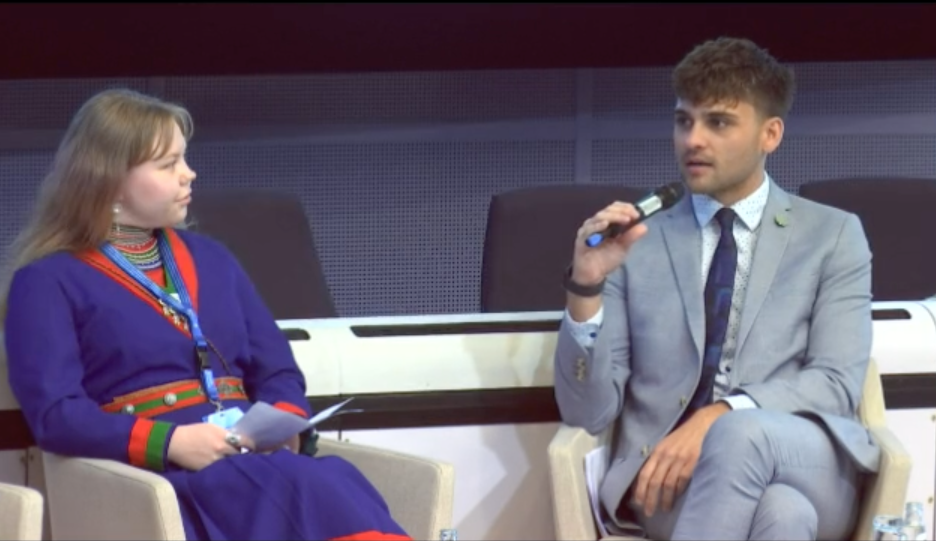
From left to right: Mikajosefin Jonsson Gehrke, Arctic Youth Dialogue representative from Sweden; Justin Langan, Arctic Youth Dialogue representative from Canada.
Exchange and learning between Arctic local authorities
Mayors from the EU-funded Arctic Urban and Regional Cooperation (AURC) network participated in discussions at the EU Arctic Forum, sharing experiences and addressing challenges such as climate change and large-scale developments.
The AURC network includes 15 local authorities from Canada, Finland, Greenland, Iceland, Norway, Sweden, and the USA, collaborating to develop local action plans.
At the forum, the Canadian municipality of Yellowknife highlighted its response to the 2023 wildfires, where the community's resourcefulness and solidarity were crucial in managing the crisis. Erik Parkkinen, Mayor of Salla, Finland, underscored the importance of preparedness and cross-border partnerships in emergency management in regions along the EU external border.
Carina Sammeli, Mayor of Luleå, noted that running businesses or public services in large, sparsely populated areas differs significantly from central urban regions. “It is more challenging to maintain efficiency in any endeavour,” says Mayor Sammeli. To address these challenges, it is important to involve the community.
We need the stories of the people living in the Arctic; we know our business, we know our life. When I am presented with a problem, the first thing to do is talk to the people living there to find the solution together.
Carina Sammeli, Mayor of Luleå
The AURC mayors are working together to create more diverse, just, and inclusive Arctic societies, while also sharing strategies for attracting and retaining people in the North. Their collaboration aims to build resilient communities capable of facing the unique challenges of the Arctic.
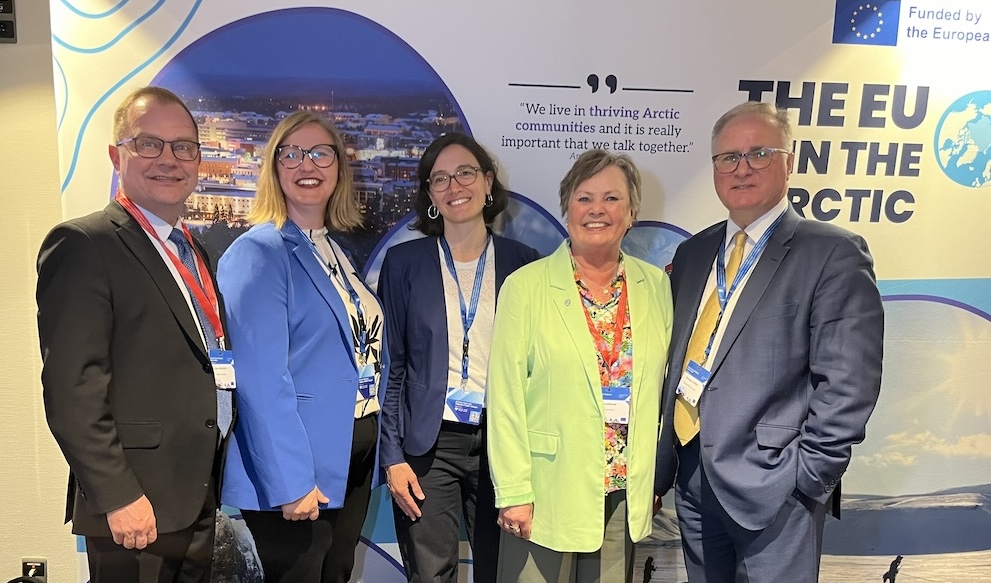
From left to right: Erik Parkkinen, Mayor of Salla (FI); Carina Sammeli, Mayor of Luleå (SE), Michela Gaifami Interreg NPA, Birgitta Larsson Mayor of Gällivare (SE), Christopher Parker Interreg NPA.
Interreg take-home messages from this event
The Interreg NPA team participated in the EU Arctic Forum, Indigenous Peoples Dialogue and EU-Arctic youth dialogue for three reasons.
- Firstly, to show with concrete examples how Interreg programmes can make a difference to reach the goals of a more green and inclusive European Arctic.
- Secondly to explain that these programmes are an instrument for Arctic communities to work together on topics of relevance to them. Interreg programmes offer resources and skills, but it is the local communities who need to come up with the project ideas and solutions.
- Last but not least, to learn what Interreg programmes can do better to facilitate local communities, indigenous peoples and youth participation in these types of cooperation programmes.
By participating to this event, the NPA team increased its understanding and awareness of the concrete issues raised. In particular of how a certain approach and use of language can discourage participation, instead of encouraging it. The NPA programme already started a process within the programme bodies to follow up on our learnings and make change happen.
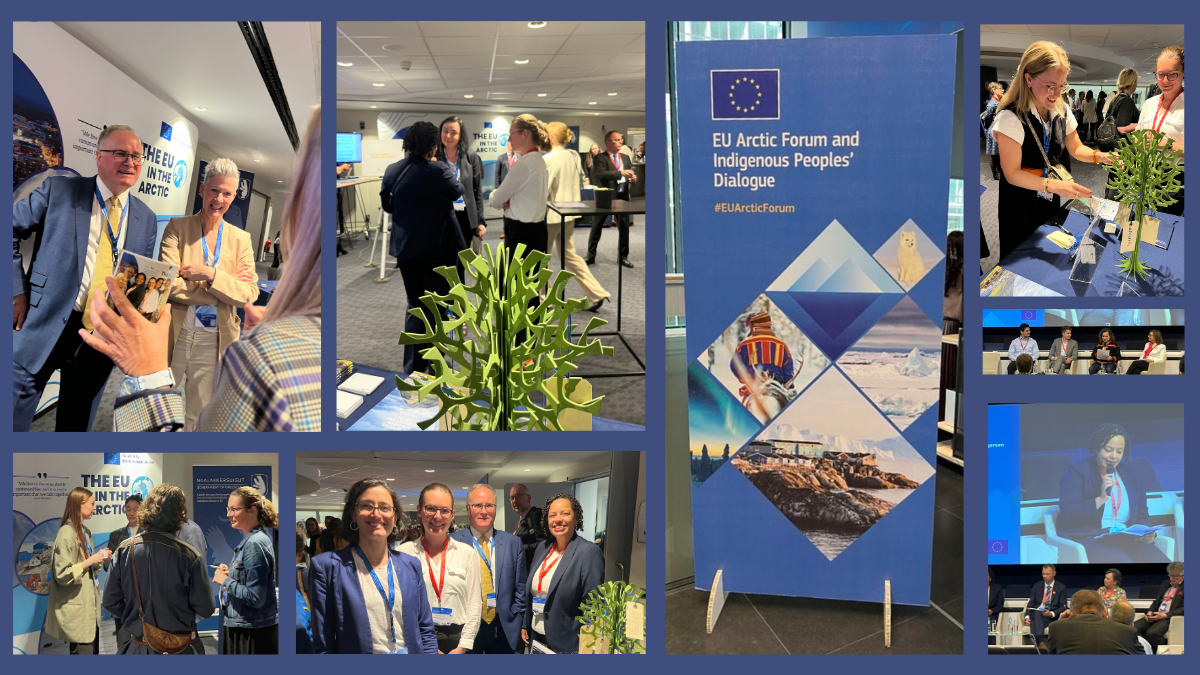
Wishes for the Arctic
Together we can make change happen, if we know what we want our future to look like. Participants to the EU Arctic Forum have written down their wishes, take a look below.
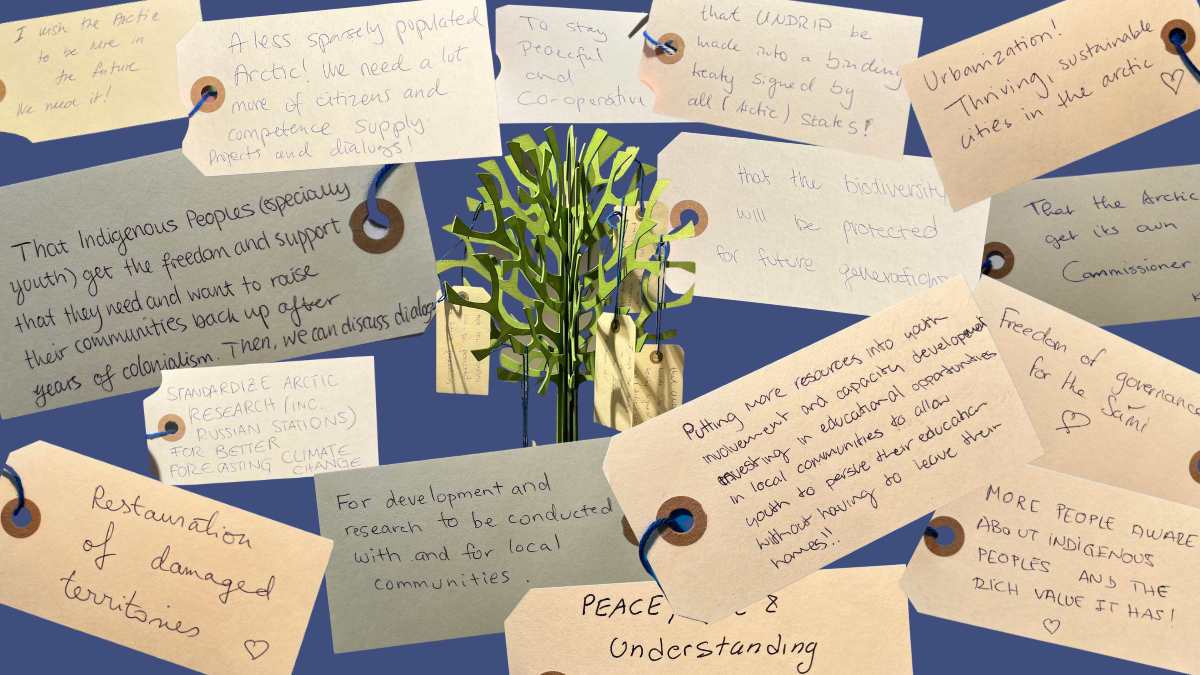
Learn more and follow the EU in the Arctic: #EUArcticForum, #EUArctic, #IndigenousPeoplesDialogue, #YT4AF, #AURC.

